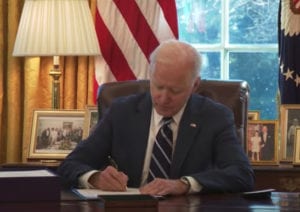Who is a member?
Our members are the local governments of Massachusetts and their elected and appointed leadership.

President Joe Biden signs the American Rescue Plan of 2021 in the Oval Office on March 11. The plan includes $65 billion in aid for municipalities.
This afternoon, President Joe Biden signed the American Rescue Plan of 2021, the latest round of stimulus funding to address the impacts of the COVID-19 pandemic.
The $1.9 trillion plan includes $350 billion in direct aid to states, local governments, tribes and territories. The legislation also provides funding for housing, education, nutrition programs, unemployment assistance, vaccines, and assistance from the Federal Emergency Management Agency.
The Senate had passed the bill last Saturday, and the House passed it on Wednesday.
“The direct local relief in the American Rescue Plan is critical to protecting front-line and emergency personnel and helping our residents and local businesses,” said Clarence Anthony, executive director of the National League of Cities, which coordinated a national campaign to advocate for the direct aid to municipalities. “Thank you, Congress, for this much-needed injection of hope as we fight to respond and recover from this pandemic.”
The federal aid package creates new state and local coronavirus relief funds, with $220 billion going to states, tribal governments and territories, and $130 billion going directly to municipal and county governments.
The law provides $65 billion in direct aid for municipalities across the country. Estimates for Massachusetts indicate that cities and towns could receive as much as $2 billion in direct aid.
• MMA estimates of American Rescue Plan allocations by city and town (192K PDF)
The NLC website has additional information about the aid package.
These funds may be used to replace revenue lost or reduced as a result of the pandemic, fund COVID-related costs, provide support to aid households and businesses impacted by the crisis, invest in economic recovery and renewal, and fund investments in water, sewer and broadband infrastructure. The funds will be provided in two blocks, in 2021 and 2022, and will be available for use through 2024.
The Treasury Department will provide specific guidance on allowable uses of the funds and will determine final allocations based on the most recent census data and the final language in the law.
The MMA had made passage of the American Rescue Plan a top priority, working closely with the NLC, which mobilized thousands of local officials and state municipal organizations to ensure that direct aid to local governments remained in the aid package.
“The American Rescue Plan Act is a true game-changer,” said MMA Executive Director Geoff Beckwith. “This law provides critical aid to every city and town in Massachusetts to stabilize essential services, inject real dollars into our communities to protect individuals, families and businesses hit hardest by COVID-19, and invest in a powerful economic recovery all across the state.”
On behalf of the MMA, Beckwith praised all members of the Massachusetts congressional delegation.
“We are so fortunate to have remarkable senators and representatives who are strong and enduring advocates for federal aid to cities and towns,” he said. “Their leadership has paved the way for passage of the American Rescue Plan.”
In Massachusetts, 37 “Metropolitan Cities” (generally communities with populations above 50,000) will receive about $1.7 billion distributed through a modified Community Development Block Grant formula, and all other communities will receive approximately $368 million distributed on a per-capita basis. Counties will receive about $1.3 billion, also distributed on a per-capita basis.
In regions that have abolished their county governments (Berkshire, Essex, Franklin, Hampden, Hampshire, Middlesex, Suffolk and Worcester), the law will keep the aid in the state by distributing the money to the cities and towns in the county based on the municipalities’ percentage of the county population, and communities may use the funds to supplement their direct aid.
Municipal leaders from communities with functioning county governments (Barnstable, Bristol, Dukes, Nantucket, Norfolk and Plymouth) will need to work with their county officials to make sure the funds are available for local government priorities.
The MMA will be providing updates at www.mma.org over the coming days, and the National League of Cities is also sharing information at www.nlc.org.